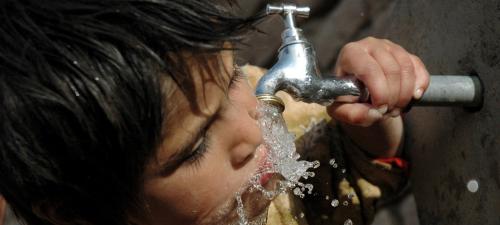UN-World Bank panel calls for ‘fundamental shift’ in water management
With 700 million people worldwide at risk of being displaced by intense water scarcity by 2030, water infrastructure investment must be at least doubled over the next five years, a panel set up by the United Nations and the World Bank recommended on Wednesday.

Child drinks water from a water-pipe.
Making Every Drop Count: An Agenda for Water Action, released by a panel of 11 Heads of State and a Special Advisor, calls for a fundamental shift in the way the world manages water so that the Sustainable Development Goals (SDGs), particularly Goal 6 on ensuring availability and sustainable management of water and sanitation for all, can be achieved.
According to the report, 40 per cent of the world’s people are being affected by water scarcity. If not addressed, as many as 700 million could be displaced by 2030 in search for water. More than two billion people are compelled to drink unsafe water and more than 4.5 billion do not have safely managed sanitation services.
The report says women and girls suffer disproportionately when water and sanitation are lacking, affecting health and often restricting work and education opportunities. Some 80 per cent of wastewater is discharged untreated into the environment and water-related disasters account for 90 per cent of the 1,000 most devastating natural disasters since 1990.
“It is my deep belief that water is a matter of life and death,” UN Secretary-General António Guterres commented upon receiving the report on Wednesday, noting that 60 per cent of human body is water.
He said that water-related natural disasters are occurring more frequently and becoming more and more dangerous everywhere, which means “water is indeed a matter of life and death” and “must be an absolute priority in everything we do.”
In a press release, World Bank Group President Jim Yong Kim stressed that Heads of State and Government make up the panel “because the world can no longer afford to take water for granted.”
“The ecosystems on which life itself is based – our food security, energy sustainability, public health, jobs, cities – are all at risk because of how water is managed today,” he warned.
The panel, created in 2016 for an initial period of two years, is advocating for evidence-based policies and innovative approaches at the global, national and local level to make water management as well as water and sanitation services attractive for investment and more disaster-resilient.
The panel calls for policies that will allow for at least a doubling of investment in water infrastructure in the next five years.
The report also highlights the essential need for partnerships between Governments, communities, the private sector and researchers.
The members of the panel are Ameenah Gurib-Fakim, Mauritius’ President (Co-Chair); Enrique Peña Nieto, Mexico’s President (Co-Chair); Malcolm Turnbull, Australia’s Prime Minister; Sheikh Hasina, Bangladesh’s Prime Minister; János Áder, Hungary’s President; Hani Mulki, Jordan’s Prime Minister; Mark Rutte, Netherlands’ Prime Minister; Pedro Pablo Kuczynski Godard, Peru’s President; Jacob Zuma, South Africa’s President; Macky Sall, Senegal’s President; Emomali Rahmon, Tajikistan’s President; and Han Seung-soo, Special Advisor and former Prime Minister of the Republic of Korea.
In an open letter, they conclude: “Whoever you are, whatever you do, wherever you live, we urge you get involved, and contribute to meeting this great challenge: safe water and sanitation for all, and our water resources managed sustainably. Make every drop count. It’s time for action.”
Source:United Nations
- 259 reads
Human Rights
Ringing FOWPAL’s Peace Bell for the World:Nobel Peace Prize Laureates’ Visions and Actions

Protecting the World’s Cultural Diversity for a Sustainable Future

The Peace Bell Resonates at the 27th Eurasian Economic Summit

Declaration of World Day of the Power of Hope Endorsed by People in 158 Nations

Puppet Show I International Friendship Day 2020

